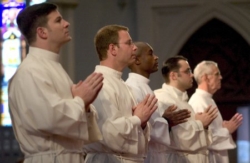Five ordained to transitional diaconate
BOSTON — Five seminarians from St. John’s Seminary in Brighton and St. John XXIII National Seminary in Weston were ordained to the transitional diaconate Jan. 28 at Holy Cross Cathedral.
The men — Deacons Ixon Chateau, Darin V. Colarusso, William S. Dunn, William C. Palladino and William N. Ventura — will be ordained to the priesthood in May.
Archbishop Seán P. O’Malley addressed the men in his homily, saying that God has called them to a life of “working hard for someone else’s benefit.”
“Today you are going to be ordained servants,” he said. “To be a servant requires great strength and loyalty.”
Archbishop O’Malley talked about Anthony Hopkins’ character in the film “Remains of the Day,” about a butler who serves his master well.
“His life is full of disappointments and humiliations, but he marches on with an incredible sense of duty,” he said. “What made his life seem so tragic was that his master was quite unworthy of such loyalty and devotion.”
The master in the movie treated Hopkins’ character like a piece of furniture and was a Nazi sympathizer, he said.
In contrast, Jesus is the perfect master, he added.
“You are called to serve the greatest master in the world, Jesus Christ, the suffering servant, our Lord and savior. Serve Him with the love and fidelity He deserves,” he said. “We must do what we do out of love for Jesus and love for His people.”
Those who follow Jesus express their love for Him in the way that they keep their promises to Him, knowing that He always keeps His promises, the archbishop added.
Those ordained to the diaconate make promises of celibacy, prayer and obedience to God and the Church.
Archbishop O’Malley went on to say that he was invited to speak at a public school once, and many of the students there had never seen a friar before.
“They were intrigued by the white cords. They thought they indicated some proficiency in karate,” he said.
The archbishop responded by saying that those knots were part of his uniform and represented the three promises he made at his ordination, he said.
Keeping these three promises means showing that God must be loved above all else, he said.
“Only as an act of love does celibacy make any sense at all,” he added.
Archbishop O’Malley encouraged the men to “be a sign of God’s love for all, especially for the little ones” and to “learn to pray for the people you are called to serve.”
The archbishop said that the men must pray often, making time and space for God.
Archbishop O’Malley also called on the men to serve as Jesus did. Jesus was obedient unto death and described His ministry as “doing the will of the one who sent me.”
“Strive to obey in a spirit of generosity and love,” he said. “How much good has been accomplished in the Church because of the loving obedience of good priests, ready to take difficult assignments, to face great challenges knowing that God prefers obedience to sacrifice?”
After the homily, the candidates for the diaconate were asked to make their promises and lay prostrate in the sanctuary during the litany of the saints. Then the archbishop ordained each with the laying on of hands. Each deacon was presented with vestments and received the Book of Gospels.
Deacon Chateau, who moved to Cambridge from Haiti in 1997, said he has wanted to be a priest since he was a child.
“This is my only dream, to be a priest,” he said.
Deacon Chateau studied at a high school seminary in Haiti before moving to Massachusetts and entering St. John’s Seminary.
He said he is looking forward to serving the people of Boston and promoting vocations.
“We need vocations for young men. We need vocations in Boston,” he said.
The archbishop addressed comments to Deacon Chateau, his family and other members of the Haitian community in creole during the homily.
Marie Clerge, a relative of Deacon Chateau, said that the family praises God for his vocation. Deacon Chateau has said that he wants to give good sermons, proclaiming the word the way Jesus did, she added.
“He even asked us to pray for him because he wants to be a very good priest,” she said.
Deacon Dunn, who is studying at Blessed John XXIII, said he found his vocation after 25 years of practicing medicine.
“It’s a giant step for me,” he said, adding that good priests were role models on his way to discovering his vocation.
Deacon Colarusso said he was a religious education teacher and lector for many years before he knew he was being called to the priesthood.
He said some priests had asked him about a religious vocation, but he had always dismissed the idea because he thought he was called to the vocation of marriage.
Deacon Colarusso, who is studying at St. John’s, said he began praying the rosary for a vocation to married life and discovered that he was called to the priesthood.
The ordination was “powerful” and gave him a sense of purpose and a direction as he prepares for his ordination to the priesthood in May, he said.
Deacon Colarusso also encouraged those who think they might be called to religious life to seek out God’s will.
“It’s very difficult in our culture for people to hear that they have a vocation,” he said. “You have to give Christ the chance to show you.”
<



















